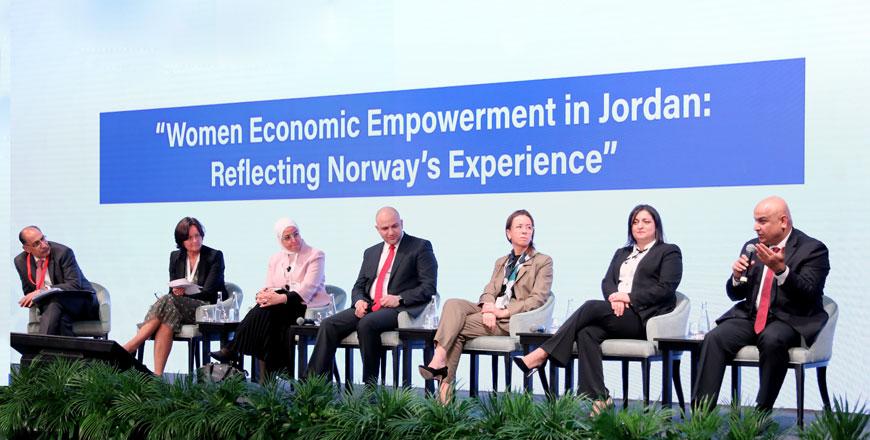You are here
Panel draws on Norwegian experience to explore increasing Jordanian women’s economic participation in labour market
By JT - Mar 04,2020 - Last updated at Mar 04,2020

The Jordan Strategy Forum and the Jordan-Norway Business Forum held a panel discussion on Monday evening to address issues related to women’s empowerment (Photo courtesy of Jordan Strategy Forum)
AMMAN — Jordan Strategy Forum held a panel discussion together with the Jordan-Norway Business Forum on Monday evening titled “Economic empowerment of women in Jordan: Studies from the Norwegian experience”, during which a panel addressed several issues related to empowering women.
During her address, Norwegian Minister of Trade Iselin Nybo noted that gender equality is “not only about fairness, but also smart economics”, according to a Jordan Strategy Forum statement.
“No state can fully reach its potential without including females in its labour market,” she added.
Nybo also highlighted Norwegian women’s “exemplary contribution” to the economy, as 30 per cent of entrepreneurs in Norway are female. Despite having one of the highest numbers of women labour participation in the world, Nybo noted that the Norwegian government has issued an action plan for female entrepreneurship to enable female students to run businesses, participate in hackathons and have access to an education that will equip them for their future.
Minister of Digital Economy and Entrepreneurship Muthanna Gharaibeh said during the discussion that providing people with 21st century skills is “an important step for future development”.
“Transportation, daycares and pay equity are three major challenges that Jordan’s labour market faces,” he said, outlining the major obstacles that deter females from entering the labour force, according to the statement.
The ministry, he added, is “committed” to creating an environment that enables women to succeed economically. To do so, Gharaibeh announced the establishment of “incubators which will be distributed across the country to open up the opportunity for all women to become entrepreneurs”.
CEO of the Jordan Strategy Forum Ibrahim Saif noted that legal, social and economic obstacles hinder women’s economic participation in Jordan.
Saif stressed in the statement the role of public-private partnerships in removing these obstacles, adding that the forum, as an independent think-tank, attaches “special importance” to the issue of women’s economic empowerment.
Maren Kyllingstad, CEO of Norwegian company EidsivaEnergi said that since the early 1970s until today, female participation in Norway has increased by 85 per cent, a growth that has brought with it “several economic gains”.
Kyllingstad also stated that a provision creating conditions for fathers to become caregivers like mothers is a “necessary step” to maintain balance in the labour force.
Heidi Austlid, head of IKTNorge, an interest group for the Norwegian ICT industry, stressed the importance of public policy reform that aims at inclusive participation in the labour market, according to the statement.
Austlid pointed out that “to attract different types of leaders, we need to show diversity in role models”.
Saroj Kumar Jha, head of the World Bank’s Mashreq region, said that women “play a crucial role” in peacebuilding in the MENA region.
“In peace talks, women should articulate what challenges are faced by diverse groups,” he added.
“I am optimistic that Jordan will demonstrate how to leap-frog in female participation through entrepreneurship, comma inside,” Kumar said.
Nisreen Barakat, a former Jordanian minister, said that Jordanian women prefer working in the public sector due to the “lack of a supportive environment” they encounter in the private sector.
In the same regard, she also said: “Jordanian women have a very impressive success record in the judicial sector.”
Rasha Laswi, lawyer and partner at Andersen Tax Legal, concluded the discussion by indicating that “every female is able to succeed despite the circumstances she faces, and this requires determination and diligence and an initiative to achieve success”.
Laswi also stressed the importance of having a supportive family, which is “one of the most important enabling factors” for the success of women in Jordan and the region, the statement concluded.
Related Articles
AMMAN — His Majesty King Abdullah and King Harald V of Norway on Monday attended the opening session of the Jordan-Norway Business Forum: Di
AMMAN — Minister of State for Legal Affairs Wafa Bani Mustafa on Sunday said that the Economic Modernisation Vision has made women’s partici
AMMAN — Women’s economic participation in the Kingdom remains sharply below male employment rates, according to the Jordan Strategy Forum (J
















